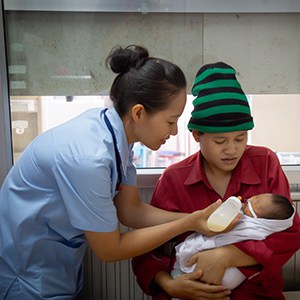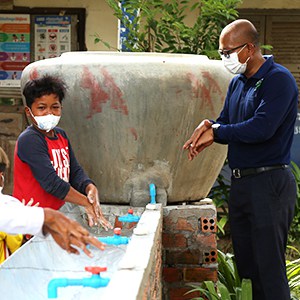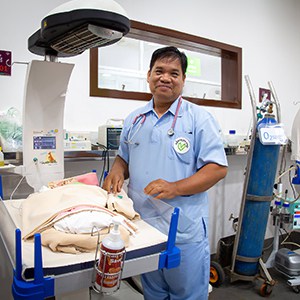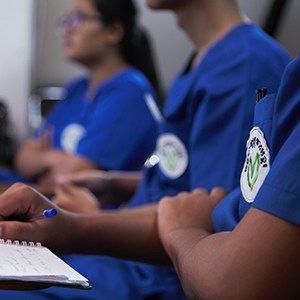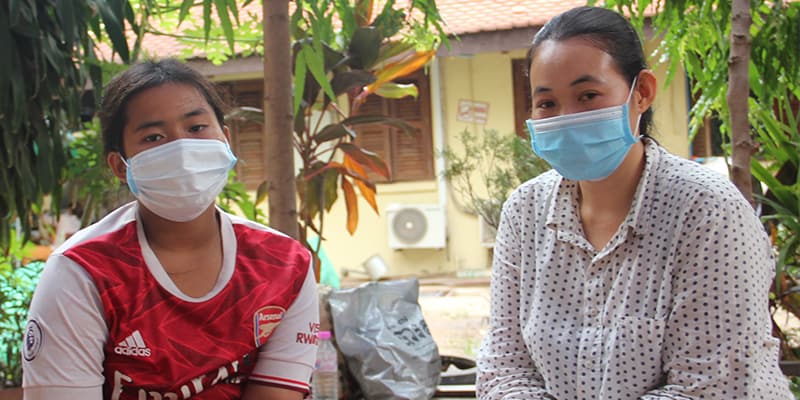AHC treats children from all 25 provinces in Cambodia, with many traveling hours at the best of times to receive the care they need. A sustained community transmission of COVID-19 in late February 2021 led Cambodia to a national outbreak. The national and local governments enacted numerous measures in an effort to curb the outbreak, including curfews and lockdowns; one measure affecting many AHC families was an interprovincial travel ban enacted on April 7, 2021. While travel for emergency medical purposes is allowed under the travel ban, the lack of public transportation has created additional barriers for families attempting to get treatment at AHC.
Since the outbreak, AHC has seen a noticeable drop in the number of patients arriving at AHC for treatment. This is especially concerning for Cambodia’s sickest children, particularly those in the Paediatric Intensive Care Unit and Oncology Unit. Read about Sreineang and her family overcoming the challenges presented by the pandemic to receive the life-saving treatment she needed during the lockdown, yet our doctors are concerned for many patients who have not been able to overcome the financial and logistical barriers to arriving at AHC at this time.
12-year-old Sreineang lives in Vernsai district, Ratanak Kiri province with her mother Pisey, two siblings and grandparents. Pisey is a single mom who teaches Khmer Language and Morality Studies in a secondary school. In October 2020, Sreineang became pale and swollen leading her to receive medicine and traditional treatment before being brought to AHC where she was diagnosed with diagnosed with Acute Lymphoblastic Leukaemia (ALL).
Around 30% of childhood cancer patients in Cambodia are diagnosed with ALL, a cancer which affects the child’s blood cells and is fatal if left untreated. ALL requires over three years of chemotherapy treatment which often makes children vulnerable to further complications due to their immunosuppressed state. Sreineang had already begun her intensive treatment, but will require two more years of chemotherapy at the hospital every three months in addition to oral chemotherapy every day.
Pisey knew that her daughter needed her scheduled treatment and could not wait until the COVID-19 situation improves or the lockdown ends, so she decided to borrow a neighbour’s motorbike since no busses or taxis were available to make the journey. Pisey was also concerned that if she did find a taxi, that the close quarters with other people might mean she would be stopped by the police or forced to quarantine. As a result, Pisey and Sreineang left at 6:00am and drove the motorbike all day and night, needing to pass through many checkpoints, finally arriving in Siem Reap at 11:00pm. The borrowed motorbike was old and difficult for Pisey to drive, even breaking down along the way. Luckily, someone decided to help fix the moto and give her free gasoline since they felt sorry for the mother and child. Pisey was also worried about traveling as a woman alone with her daughter along the deserted highways, but she felt her daughter’s treatment was more important.
Sreineang’s condition has greatly improved since beginning her chemotherapy treatment. However, Pisey is still concerned about returning back to Ratanak Kiri both because the 17 hour journey will be more difficult for Sreineang after her chemotherapy treatment as well as because the mother and daughter will be required to quarantine at home after returning from Siem Reap. Despite the immense challenges, Pisey is grateful for the life-saving treatment saying “I love and trust AHC. All staff members starting from guards at the gates and nurses and doctors are friendly and highly caring with all patients. They always talk nicely to patients and parents, provide good services and have extra activities like drawing and education.”
